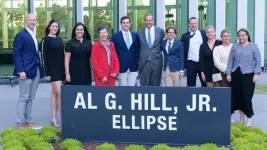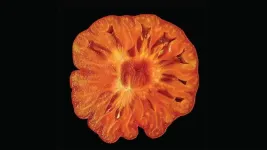(Press-News.org) The Trinity Family Foundation has pledged a generous $4 million gift to the Center for BrainHealth to advance the science of brain health, in memory of Al G. Hill, Jr., a renowned Dallas entrepreneur and philanthropist.
The thoughtful investment will support burgeoning research at the Center for BrainHealth, focused on deepening our understanding of neuroplasticity – the brain’s lifelong ability to change, adapt, get stronger and work better.
In recognition and gratitude, the center’s premier gathering hall is now named the Al G. Hill, Jr. Ellipse. This one-of-a-kind space features a magnificent chandelier created by David Gappa called “Introspection”. The custom piece of art with handblown glass depicts active neural synapses. The versatile venue welcomes leaders and scientists from around the globe and provides a unique space for major gatherings.
"Al was a true citizen scientist, said the center’s chief director Sandra Bond Chapman, PhD. Over the years, he challenged us to continue uncovering and validating ways to measure brain improvement. We are humbled by this generosity, and our team of experts will continue making the seemingly impossible a reality – developing the first-ever measurements tracking improvement in the brain’s function, along with accessible protocols to continually build brain-healthy habits."
"Center for BrainHealth is laser-focused on the science of brain health and performance. Their distinguished researchers are taking giant strides to spark a brain health revolution among all people, worldwide. We believe there could be no more fitting way to celebrate our father’s legacy," said Heather Hill Washburne and Elisa Hill Summers of The Trinity Family Foundation.
With this gift and other recent support, center’s Limitless BrainHealth Campaign has now passed the $46 million mark toward its $50 million goal.
"We have deep appreciation and gratitude for this monumental gift from The Trinity Family Foundation. Their support empowers the center to continue its pioneering science and expands is ability to reach all sectors of the population and empower people to thrive through better brain health," said Debbie Francis, Limitless BrainHealth Campaign co-chair and longtime friend of Al Hill, Jr.
About Center for BrainHealth
Center for BrainHealth, part of The University of Texas at Dallas, is a translational research institute committed to enhancing, preserving and restoring brain health across the lifespan. Leading-edge scientific exploration is translated quickly into practical innovations to improve how people think, work and live, empowering people of all ages to unlock their brain potential. Translational innovations build on Strategic Memory Advanced Reasoning Tactics (SMART), a proprietary methodology developed and tested over three decades. The center’s signature initiative is The BrainHealth Project, an ongoing, population-scale study that introduces a multidimensional, measurable understanding of brain health and explores our lifelong ability to impact the brain’s fitness, no matter the starting point.
END
The Trinity Family Foundation grants major gift to Center for BrainHealth to honor the memory of Al G. Hill, Jr.
2023-10-19
ELSE PRESS RELEASES FROM THIS DATE:
Research shows new documentation tool could help optimize seizure treatments in patients with epilepsy
2023-10-19
New research from the University of Colorado Anschutz Medical Campus studies a new tool that will help medical providers identify patients who are failing epilepsy treatments earlier in order to change treatment to rapidly optimize positive outcomes.
The study was published online today in Neurology® Clinical Practice, an official journal of the American Academy of Neurology.
The study was a quality improvement project that tested the implementation of an easy-to-use standardized electronic health record documentation tool, which dramatically improved the accuracy and completeness of important clinical documentation ...
Neuroscientists to reveal new insights into Alzheimer’s
2023-10-19
Dementia experts from UC San Francisco will join their peers from around the globe at the annual Clinical Trials on Alzheimer’s Disease (CTAD) conference in Boston from Oct. 24 to 27.
Presentations cover breakthroughs in therapies that clear amyloid – a hallmark of Alzheimer’s – and a symposium on patients with early Alzheimer’s symptoms who were treated with the anti-amyloid medication donanemab, which may be approved by the end of the year. Other topics include novel treatments, diagnostic blood biomarkers, amyloid-related imaging abnormalities (ARIA) and Medicare coverage.
This year’s ...
New study finds racial and ethnic disparities persist in access to chiropractic care and physical rehabilitation for adults with low back pain
2023-10-19
BOSTON - Low back pain is the leading cause of disability worldwide and a major driver of healthcare costs in the United States, according to the World Health Organization. Over the last 20 years, recommended treatment of low back pain has shifted from use of pain medications including opioids to early use of nonpharmacologic treatments such as spinal manipulation and therapeutic exercise which are commonly provided by chiropractors and physical therapists. However, while nearly all Americans will experience back pain at some point in their lives, most Americans ...
Record-breaking fast radio burst offers path to weigh the Universe
2023-10-19
In a paper published today in Science, a global team led by Macquarie University’s Dr Stuart Ryder and Swinburne University of Technology’s Associate Professor Ryan Shannon, report on their discovery of the most ancient and distant fast radio burst located to date, about eight billion years old.
The discovery smashes the team’s previous record by 50 per cent. It confirms that fast radio bursts (FRBs) can be used to measure the “missing” matter between galaxies.
The source of the burst was shown to be a group of two or three galaxies that are ...
Unearthing the ecological impacts of cicada emergences on North American forests
2023-10-19
WASHINGTON (October 19, 2023) – Every 13 or 17 years, billions of cicadas emerge from the ground to reproduce in eastern North American deciduous forests. One of the largest emergence events of these insects happened in 2021 when theBrood X cicadas emerged. Researchers who studied that once-in-a-generation event are now unveiling the impact this occurrence had on forest ecosystems, specifically on birds, caterpillars and trees.
In a new study published today in Science, researchers at the George Washington University, Georgetown University and the University of Maryland quantified the widespread ...
Agricultural landscapes and heat erode nest successes of birds across the United States
2023-10-19
Maximum temperature extremes reduce the nesting success of birds across the United States by nearly 50% in agricultural landscapes but not forests, according to a new study based on more than 20 years of citizen-science nest-monitoring data. The findings show that future warming may exacerbate the negative effects of habitat conversion on bird fitness, especially among species of conservation concern in human-dominated landscapes. Habitat conversion and climate change are fundamental drivers of biodiversity loss worldwide. However, ...
Observations from a bright fast radio burst probe the distant universe
2023-10-19
An unusually high-energy fast radio burst (FRB) from a high-redshift galaxy has offered new insights into the distant universe, challenging current models of FRB emission. The findings also help constrain key attributes of these astrophysical phenomena. FRBs are brief pulses of radio emission originating from distant extragalactic sources. Although the astrophysical processes that cause FRBs aren’t fully understood, the signals they produce can be used to infer information about the cosmic environments they pass through as they travel across the universe, including the nature of ...
Introducing NorthPole: a brain-inspired chip design that enables low-power AI inference
2023-10-19
Researchers present NorthPole – a brain-inspired chip architecture that blends computation with memory to process data efficiently at low-energy costs. Since its inception, computing has been processor-centric, with memory separated from compute. However, shuttling large amounts of data between memory and compute comes at a high price in terms of both energy consumption and processing bandwidth and speed. This is particularly evident in the case of emerging and advanced real-time artificial intelligence (AI) applications like facial recognition, object detection, and ...
Periodical cicada emergence disrupts food webs, increases plant damage in eastern North American forests
2023-10-19
The periodical mass emergence of cicadas in eastern North American forests can “rewire” forest food webs and initiate a cascade of ecological impacts that propagates throughout the food chain, according to a study that quantified effects of the 2021 Brood X cicada emergence. The study found that when insect-eating birds have abundant prey in the form of cicadas and thus shift their focus away from their usual repast – leaf-eating caterpillars – the caterpillars feast more heavily upon the leaves of oak saplings, doubling insect leaf damage. “Although previous studies have documented strong ecological ...
You say genome editing, I say natural mutation
2023-10-19
For tens of thousands of years, evolution shaped tomatoes through natural mutations. Then, humans came along. For centuries, we’ve bred and cherry-picked tomatoes with our preferred traits. Today, CRISPR genome editing allows us to make new crop mutations that improve traits even further. However, individual mutations, whether natural or engineered, don’t work alone. Each operates in a sea of thousands of so-called “background” mutations. These changes have been sowed by evolution and agricultural ...



